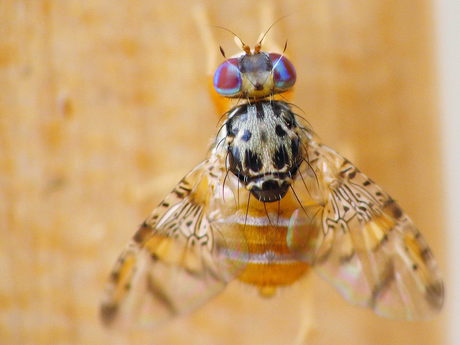WA to trial genetically modified medflies

Western Australia, a bastion of resistance against all genetically modified organisms (GMOs) last decade, announced this week that it will trial a novel GM sterile-insect technology developed by UK company Oxitec that could rid the state of the Mediterranean fruit fly (Ceratitis capitate, or medfly), a serious horticultural pest.
The WA Department of Agriculture will evaluate Oxitec's proprietary RDL (repressible dominant lethal) technique in a biosecure greenhouse next year. RDL has not yet been deployed against any full-scale campaign against an insect pest in the field.
Brazil conducted a successful small-scale field release in 2012 of an Oxitec-developed strain of the mosquito Aedes aegypti, which transmits the potentially lethal viral infection dengue fever to humans. Dengue is a serious public health problem in some regions of Brazil.
Western Australia is the only Australian state with an endemic medfly problem. It has become a serious and persistent pest for the citrus industry in south-western WA, but targets a broad range of fruits, vegetables and nuts.
Medfly has occasionally been detected — and rapidly eradicated — in South Australia, after crossing the Nullarbor in fly-struck fruit carried by travellers. But horticulture in eastern Australia is under siege from a native species, the Queensland fruit fly (Batroceras tryoni), which has been expanding its range as the climate warms.
Oxitec's RDL technology employs male flies carrying a dominant gene that is rapidly lethal to female flies when it is activated. Oxitec has attached a tetracycline repressor element to the lethal gene that keeps it in a quiescent state as long as the male flies are fed with the antibiotic tetracycline during rearing.
In a real-world eradication campaign, the female RDL flies would be mass-reared and released in areas where the medfly is a problem, to outcompete wild-type males in matings with wild-type females. Because the lethal gene is dominant, it will be expressed by both male and female progeny of RDL matings. They will die during larval development, or soon after hatching.
Oxitec has also inserted a fluorescence marker gene, called DsRed2, into its RDL medflies that causes them to glow red under UV light, making it easy to monitor RDL fly numbers during the contained trial.
Commenting on the planned trial, Professor Ary Hoffmann, an Australian Laureate Fellow in the School of Biosciences at the University of Melbourne, said: “The RDL technology used in this strain has been around for a while and certainly has potential, but it has not yet been used in any large-scale releases in any insect, including in mosquitoes where experiments have been carried out for a number of years.
“In the medfly, releases have only been undertaken so far in cage environments, and it can be difficult to extrapolate results from cage studies to the field situation where the environment is very different."
He said the technology depends on males carrying the genetic construct having a high fitness (high mating success) compared to males in natural population.
“This can be a challenge to achieve, because insects raised in the laboratory for a number of generations inevitably become adapted to the artificial environment where they are reared.
“The approach also depends on expression of the genetic construct in offspring of the released males, and this will need to be monitored carefully.
“And, of course, the new technology will need to compete with the traditional sterile insect technique (SIT) where irradiated males (rather than ones carrying an engineered genetic construct) are released in large numbers in the environment.
“This represents an approach that has proved successful in field situations in other parts of the world, particularly when combined with other approaches."
Melatonin helps to prevent obesity, studies suggest
In an experiment carried out in rats, chronic administration of melatonin prevented obesity to a...
Personality influences the expression of our genes
An international research team has used artificial intelligence to show that our personalities...
Pig hearts kept alive outside the body for 24 hours
A major hurdle for human heart transplantation is the limited storage time of the donor heart...







